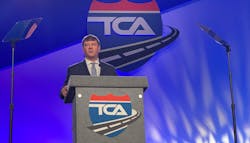FMCSA’s more flexible HOS proposal heads to White House for approval
ORLANDO, Fla. — The Federal Motor Carrier Safety Administration (FMCSA) has submitted a proposed Hours-of-Service regulations rule change to the White House’s Office of Management and Budget (OMB). The proposal is expected to make HOS more flexible for commercial drivers.
FMCSA Acting Administrator Jim Mullen, speaking at the Truckload Carriers Association conference this week, announced the agency filed the final rule with the OMB on Monday, March 2.
“While I can’t go into the specifics of this final rule, please know that the goal of this process from the beginning has been to improve safety for all motorists and to increase flexibility for commercial drivers,” Mullen told the crowd of carrier executives and suppliers on Tuesday, March 3.
The Hours of Service Notice of Proposed Rule Making (NPRM) was published in August 2019 as lawmakers looked to change regulations to provide truck drivers with more flexibility.
Mullen declined to say if all the initially proposed changes made it into what was submitted to the White House this week. That NPRM in August 2019 included five key changes:
Flexibility for the 30-minute break rule by tying the break requirement to eight hours of driving time without interruption for at least 30 minutes; and allowing the break to be satisfied by a driver using on-duty, not-driving status, rather than off-duty.
Modifying the sleeper-berth exception to allow drivers to split their required 10 hours off duty into two periods: one period of at least seven consecutive hours in the sleeper berth and the other period of at least two consecutive hours either off duty or in the sleeper berth. Neither period would count against the driver’s 14‑hour driving window.
Allowing one off-duty break of at least 30 minutes but not more than three hours that would pause a truck driver’s 14-hour driving window, provided the driver takes 10 consecutive hours off-duty at the end of the work shift.
Modifying the adverse driving conditions exception by extending by two hours the maximum window during which driving is permitted.
Changing to the short-haul exception available to certain commercial drivers by lengthening the drivers’ maximum on‑duty period from 12 to 14 hours and extending the distance limit within which the driver may operate from 100 air miles to 150 air miles.
The proposed rule would not increase driving time and would continue to prevent commercial vehicle operators from driving for more than eight consecutive hours without at least a 30-minute change in duty status.
FMCSA’s proposed rule on HOS regulations is estimated to provide $274 million in savings for the U.S. economy and American consumers, according to the government. The trucking industry, a big component of the national economy, employs more than seven million people and moves 70% of the nation’s domestic freight, according to the DOT.
The final rule submitted to OMB could be different. The executive agency has 90 days to approve or reject the Final Rule. If approved, the Final Rule would be published in the Federal Register. But it could still be a while — at least months, if not years — before any changes to HOS would go into effect.
Along with expected legal challenges from advocacy and labor groups, electronic logging device (ELD) manufacturers will need time to update software and reprogram devices, which could take at least six months.
The Truck Safety Coalition, Advocates for Highway and Auto Safety and Teamsters union initially came out against the proposed changes last summer, saying longer work periods will increase fatigue and lead to more health problems for truck drivers.
FMCSA said that compliant ELDs do not have to be updated as a result of the proposal. But it also stated, however, some manufacturers provide features such as alerts when a driver may be close to an HOS violation.
The 2019 proposal is backed by industry groups such as the American Trucking Associations and the Owner-Operator Independent Drivers Association.
First adopted in 1937, FMCSA’s HOS rules specify the permitted operating hours of commercial drivers. In 2018, FMCSA authored an Advanced Notice of Proposed Rulemaking to receive public comment on portions of the HOS rules to alleviate unnecessary burdens placed on drivers while maintaining safety on highways and roads. In response, the FMCSA received more than 5,200 public comments. The changes were initiated by then-FMCSA Administrator Raymond P. Martinez, who resigned in October 2019.
About the Author
Josh Fisher
Editor-in-Chief
Editor-in-Chief Josh Fisher has been with FleetOwner since 2017. He covers everything from modern fleet management to operational efficiency, artificial intelligence, autonomous trucking, alternative fuels and powertrains, regulations, and emerging transportation technology. Based in Maryland, he writes the Lane Shift Ahead column about the changing North American transportation landscape.

